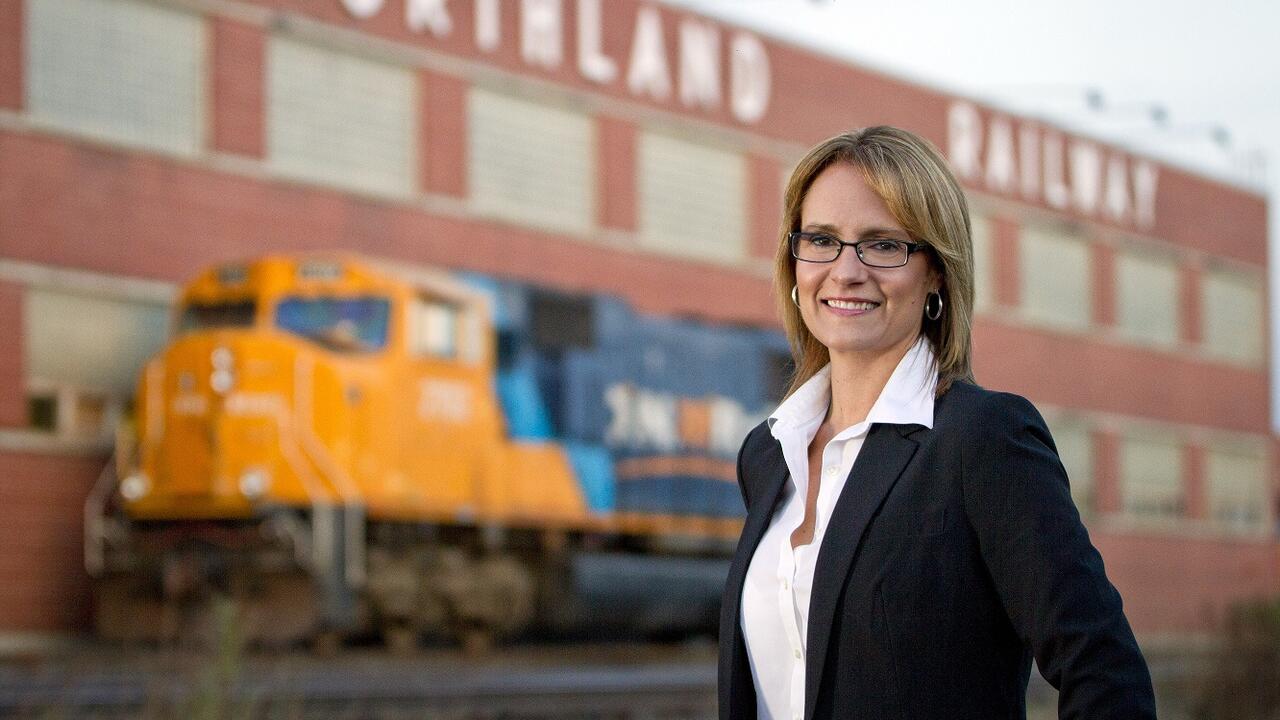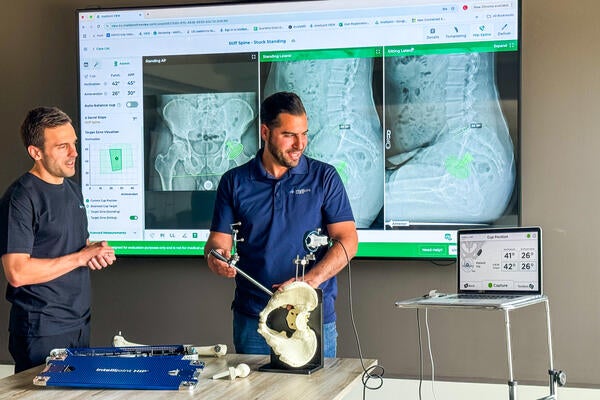
Cold call leads to career with railway and bus company
Corina Moore (BASc 1997) heads up Ontario Northland, a key lifeline for Northern Ontario residents

Corina Moore (BASc 1997) heads up Ontario Northland, a key lifeline for Northern Ontario residents
Corina Moore (BASc 1997, Systems Design) remembers exactly how she picked Waterloo Engineering, the first step on a career path that would take her around the world and back home again to Northern Ontario.
It was on a weekend about 25 years ago that the shy teenager from the hamlet of Commanda - population 50, give or take a few - looked around campus with her mother as she tried to decide where to go and what to take after high school.
Engineering had occurred to her, but so had science, and Waterloo was just one of the universities on her list for an informal tour.
In a classic case of serendipity, Moore came across a door that had been propped open and went inside to find a group of systems design engineering students studying for an exam.
An hour later, prodded by her mother to ask some questions, she had caught their enthusiasm for the program and was sold on Waterloo’s co-op system to help pay her way through school while sampling different jobs.
“I left there and thought, ‘That’s what I want to do,’” recalls Moore, now president and CEO of Ontario Northland, a historic transportation agency with more than 750 employees. “Systems design seemed to include all disciplines, taking a systematic approach, which really interested me.”
Accepted into the program, she moved into a residence with more people on each floor than in her entire hometown and did her first two work terms at IBM.
Moore graduated in 1997 with an option in business management and stayed in Waterloo for a series of responsible positions in process automation, software development for remote printing and establishing Internet connectivity at hotels.
She often spent more time on the road than at home as work took her to the U.S., Europe and Asia, but when her first child was born in 2004, Moore and her husband, Jay, decided to return to their roots to be close to family in the North Bay area.
Moore made a “cold call” to Ontario Northland to offer her services, and a few months later landed a job as a director in the North Bay-based railway company’s telecommunications division.
Like her time at Waterloo Engineering, it proved to be a good fit.
Struck by the vital role the agency’s trains, buses and other services play in northeastern Ontario, Moore switched tracks into human resources and then became chief operating officer, a role in which she negotiated 11 collective agreements with five different unions.

An agency of the provincial government that dates back to 1902, Ontario Northland has over 700 miles of track, including almost 100 bridges. It stretches from North Bay to Moosonee, providing the only land link to the James Bay coast.
In addition to transporting 60,000 people and shipping 32,000 carloads of freight by rail each year, its bus networks provide service to more than 250,000 passengers and handle 220,000 parcels annually.
Moore says construction of the rail line opened up the region for development, with towns forming and prospering along its route as it progressed north. It is now a vital contributor to economic development and community sustainability.
Rail and bus services provide a key lifeline for residents in the harsh northern climate and unique terrain. Moore says many students travelling to school and seniors attending medical appointments, for example, wouldn’t have viable transportation options without Ontario Northland.
“I’m just really proud to be part of something that is of such vital importance in Northern Ontario as the trains and bus service we provide,” she says.
Now a mother of three, Moore has been president and CEO since 2014. Her position involves long hours using both her engineering training and her appreciation for the people at all levels responsible for its success.
Being close to home, however, also means plenty of time with family and in local hockey arenas, where her husband coaches and holds skills camps in addition to his business interests.
“It’s work-life balance,” says Moore. “We work hard, we play hard, and we enjoy everything the north has to offer.
“I gained a real appreciation for global business, but it was really nice to be able to bring that back home, raise my family up here and also empower our employees to be part of something great.”
It all goes back to that open door, Moore’s decision to walk through it and the unique education she discovered when she did.
“You don’t know what you want to do, and you don’t know what you don’t want to do, until you’re in a co-op program and you actually gain first-hand knowledge,” Moore says. “That’s how I promote the University to this day.”

Read more
Two University of Waterloo affiliated health-tech companies secure major provincial investment to bring lifesaving innovations to market

Read more
Waterloo co-op student applies engineering and tech skills at Caivan to support purpose-built housing and build land-development expertise

Read more
How Doug Kavanagh’s software engineering degree laid the foundation for a thriving career in patient care
The University of Waterloo acknowledges that much of our work takes place on the traditional territory of the Neutral, Anishinaabeg, and Haudenosaunee peoples. Our main campus is situated on the Haldimand Tract, the land granted to the Six Nations that includes six miles on each side of the Grand River. Our active work toward reconciliation takes place across our campuses through research, learning, teaching, and community building, and is co-ordinated within the Office of Indigenous Relations.